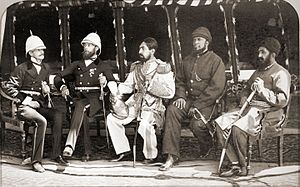 Image via WikipediaThe world is getting more complicated everyday.
Image via WikipediaThe world is getting more complicated everyday.
A few weeks ago, we heard that the State Department is building its own mini-Army in the wake of the troops drawdown in Iraq. It will soon have its own helo-fleet. American diplomats and civilians heading to the warzones are now routinely trained in Indiana in offensive driving, weapons training and a whole lot more... we're trying to get diplomats to be like, you know, transformed ....to make them more like troops?...I don't know .... but send them to the boondocks for sure ...give them something more than skillcraft pens....
Now, Spencer Ackerman has an interesting piece over at Danger Room: Army Asks Itself: Shouldn’t We Be Diplomats? Quick excerpt:
Oh, for the simple days, when adversaries sent their diplomats to negotiate political disagreements and sent in their armies when talks broke down. Now, a small group of soldiers and civilians are packing themselves this week into the suburban Virginia offices of a major defense contractor to hash out how to make troops more like… diplomats.
A decade in Iraq and Afghanistan has taught the U.S. Army — painfully — that the world no longer works that way. There probably aren’t going to be any experienced diplomats on hand at Combat Outpost Middle-Of-Nowhere, so soldiers have to engage in DIY Diplomacy. Platoon commanders in their early twenties need to go from directing artillery fire one minute and sipping tea with the potentates of the town they just shelled the next. And their late-twenties company commanders may end up negotiating truces or even alliances of convenience with the bad guys who prompted the artillery barrage in the first place.
That’s where something called Unified Quest comes in. Every year, the Army’s chief of staff instructs talented mid-career and senior officers and senior enlisted (wo)men to evaluate where the service is falling short — and propose remedies. On Tuesday, about 120 soldiers and their civilian and foreign-military friends (and even some Marines) swarmed onto the manicured northern Virginia campus of mega-consultant Booz Allen Hamilton to kick off the first four-day debating bull session for Unified Quest 2011, to figure out how best to cultivate the next generation of Army leaders. One answer, hotly debated by the 25 or so soldiers and civilians in attendance: make them better diplomats.
[...]
Others on the panel argued to broaden the scope of what Army negotiations are for. They’re not just to persuade opposing or neutral forces. One war veteran remembered, “I spent a lot of time negotiating with my international partner, to get around his national limitations” on engaging in combat. Another pointed out that “it also allows us to build alliances across the interagency” — an ironic statement, considering that the Army might not be so deeply in the negotiations business if the State Department was more willing and able to send its diplomats out to Combat Outpost Middle-of-Nowhere. (Interestingly, according to one of the conference’s public-affairs people, there aren’t any State Department representatives participating in Unified Quest.)
After monthly debating sessions on Unified Quest end in April 2011, Dempsey will provide its holistic view on how the Army needs to prepare its next generation to his boss, General George Casey, the Army’s chief of staff.
Casey will decide whether to accept and how to implement Unified Quest’s instructions on everything from ethics in warfare to cyber operations. The chief is an advocate of Unified Quest — a photo of his face graces the cover to the Official Unified Quest Looseleaf Binder. Still, convincing him to embed diplomacy as a core “proficiency” of the next round of majors and colonels might take some negotiation.
Read the whole thing here.
In my long years as a watcher, I've never seen or heard of State do something like the Army's Unified Quest. For one thing, I don't think the agency ever had enough money to do a powwow in Booz Allen Hamilton's campus to do mega-brainstorms like this. The other reason, of course, is bench strength. There is just not enough people out there. DOD has more band members, more lawyers, more PD folks, more of everything when it comes to resources. State has to make do with persistent staffing gaps (Congress' fault and partly its own for bull headed rigidity) and limited resources sucked up in priority war zones 1 and 2, and almost war zone posts.
That's not an excuse, dudes. It just is. Decades in the making, through several secretaries of state and a fickle Congress who was never quite enamored with diplomats.
Now, the warrior diplomats -- they have historical precedents, of course. An example below from across the pond.
In the 1800s, the Brits wanted a diplomatic mission in Kabul after Russia sent an envoy there. When the Afghans refused, the British government launched the Second Anglo-Afghan war in 1878. We all remember that, right? A British major was tasked to negotiate a treaty to end the war, and did so successfully. He was knighted and appointed envoy in Kabul only to be shot and killed (together with all his security guards) by the locals.
Did not turn out very well.
In the case above, the Brits shoot first and talks followed. Is that going to be our new model in the world of the future where America is in perpetual war?
Now-- if the Army gets to be diplomats, also -- might Congress just decide to defund the diplomatic service? Probably not. After all, USAID is still around, despite the proliferation of aid groups within the federal government.
Of course, one never knows. There is an election down the road, and these are crazy times indeed.



No comments:
Post a Comment